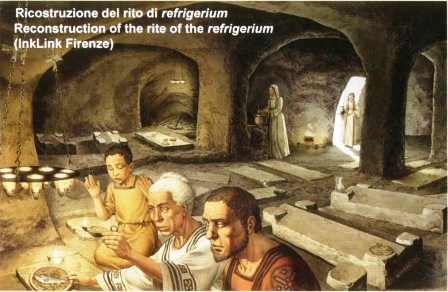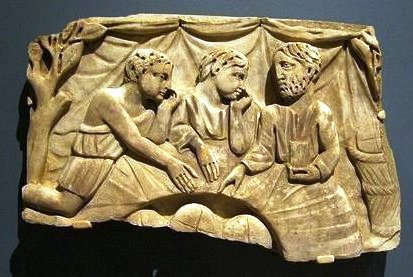 I just put together an article for The Wanderer, my usual weekly column which was the origin of this blog.
I just put together an article for The Wanderer, my usual weekly column which was the origin of this blog.
In the course of the column I offered this. It is something I have written on before, since I have written on the Roman Canon before. Still… it may be of interest to new readers.
___
The ancient Roman orator, philosopher, and statesman M. Tullius Cicero (+ 43 BC), and other authors as well, use the verb refrigero for “to cool off, make cool” and “to relieve, refresh”. It also has a moral overtone, in the sense of “cooling passions”. Think of “taking a cold shower”. In ecclesiastical use refrigerium means “a cooling; a mitigation, consolation”. We find a use of refrigerium also in the magnificent Pentecost sequence Veni, Sancte Spiritus.
So, just what is our refrigerium in the Canon? Our context is a moment in which we explicitly pray for the repose of souls of the dead.
Refrigerium concerns refreshment and coolness, the resting of passions, associated with happiness with the Lord at His heavenly banquet. Think of the parable Jesus recounted about the rich man, in tradition called Dives (“dee-vays”) and the beggar Lazarus (Luke 16:19-31). Lazarus dies and goes to “Abraham’s bosom” to be refreshed. When Dives dies, he goes to rather hotter place. Dives longs for a single cooling drop of water from Lazarus’s fingertip.
In the ancient Church a custom developed from the pagan practice of banquets at the tombs of loved ones, ancestors. The banquet was called a refrigerium. It was a kind of “family reunion”. The Christian refrigerium continued this, even as it also prefigured the banquet prepared for us by God in heaven. The Roman catacombs of St. Callistus and St. Sebastian have spaces intended for these refrigeria meals. At Tipasa (modern Tefassad, Algeria) tables for these banquets are still visible near the churches of martyrs. Refrigeria were tolerated because of the deep cultural roots and the sensibilities of the faithful. Sometimes, however, they turned riotous. St. Augustine of Hippo (+430) restricted and refocused them on the increasingly important cults of martyrs and on how the Eucharist can impact state of the dead. Refrigeria would eventually be entirely suppressed in North Africa. Earlier, by St. Ambrose’s time (+397), they had already been suppressed at Milan in Northern Italy.
 Augustine recounts an episode about his mother, St. Monnica, when she was with him in Milan. Monnica carried on with her North African custom of refrigeria (called laetitia in Confessions 6.2.2) which raised many Milanese eyebrows, including those of bishop Ambrose. Augustine says that Ambrose instructed Monnica not to do this in Milan, it was not their local custom. Ambrose said that when he was in Rome, he followed the Roman laws concerning fasting, which were different from those of Milan: “When I am here I do not fast on Saturday, but when I am at Rome I do; whatever Church you may come to, conform to its custom” (cf. Augustine ep 36.14.32 and ep 54.2.3).
Augustine recounts an episode about his mother, St. Monnica, when she was with him in Milan. Monnica carried on with her North African custom of refrigeria (called laetitia in Confessions 6.2.2) which raised many Milanese eyebrows, including those of bishop Ambrose. Augustine says that Ambrose instructed Monnica not to do this in Milan, it was not their local custom. Ambrose said that when he was in Rome, he followed the Roman laws concerning fasting, which were different from those of Milan: “When I am here I do not fast on Saturday, but when I am at Rome I do; whatever Church you may come to, conform to its custom” (cf. Augustine ep 36.14.32 and ep 54.2.3).
This is where we get the phrase, “When in Rome, do as the Romans do.”
In sum, the Roman Canon’s petition for a place of refreshment, refrigerium, bears witness to the belief of an interchange of help between the living and the departed.


































Great! Now everytime I open the refrigerator, I will be reminded to pray for the dead.
Thanks for this. It is especially nice to read now, to wash the bad taste away from hearing the pastor of a local parish recently tell the congregation there that Purgatory thing was dubious, as it is not in the Bible and, beside, Jesus can heal us all at once any time He wants to. Yes, this is a Catholic priest.
Stories about the practices of the early Church and the dominant culture it arose in always are good to hear. It is corrective to hear what people actually did and what they thought about it.
Walker Percy used this phrase (on the lips of Thomas More in “Love in the Ruins”) as proof that refrigeration must be an attribute of heaven.
I once convinced a Protestant of the existence of Purgatory by pointing out its biblical roots (which go back to the Old Testament exhortation to pray for the dead).
Re “refrigerium”: my Father Lasance Missal translates it as “a cool place”. I expect that on a hot Roman summer day, the catacombs are pretty cool places.
Thank you. I have printed it out to show my 11 year olds, who asked yesterday where the phrase “when in Rome” came from.
I am not yet at a point where I can read the prayers of the Canon of the Mass in Latin, so I wasn’t even aware of the word refrigerium in the prayers for the dead. Without your explanation, it would have had another connotation for me.
C.S. Lewis has a reference in The Great Divorce to the Refrigerium, in the narrator’s dialogue with George MacDonald in Chapter 9:
“Sir,” said I, “I had almost forgotten about it, and I have no anxiety about the answer now, though I still have a curiosity. It is about these Ghosts. Do any of them stay? Can they stay? Is any real choice offered to them? How do they come to be here?”
“Did ye never hear of the Refrigerium? A man with your advantages might have read of it in Prudentius, not to mention Jeremy Taylor.”
FR:
“………….Round the floor your trotters shake
“isn’t it the truth I tellyou
Lots of fun at Fineggan’s wake”
Pure curiosity : do you, does anyone, can anyone (given so much destruction of manuscripts and books), know if Irish wakes arose independantly or derived from Rome, or even synergetically?
Certainly capable of getting out of hand- I know- but give me an outofhand Irish wake (well, admittedly Ive not lnown em staesside) over a priest giving a pagan eulogy(only sort pssible, I suspect) at a funeral mass.
In Spanish we call a snack, a “refrigerio”… something to refresh you before the main meal.
Interesting stuff. Thank you.
I believe picnics at the graves of deceased loved ones are still a part of All Souls Day or “Day of the Dead” commemorations in places such as Mexico and the Phillippines. Also, it was common in the 19th century for both Catholics and Protestants to have family picnics and outings in cemeteries — partly because they were more mindful of death in general, but also because in some communities, cemeteries were about the only “green space” available.
Wow, very interesting read. This past Sunday was the 2 year anniversary of my beloved grandpa’s passing. I pray for him often, and often ask that if he’s in a position yet to do so, to please intercede for me.
Really fascinating information, Father.
I visited the catacombs of St. Sebastian some three years ago on an unforgettable trip to Rome. We toured the refrigerium room where the pilgrims would have a meal in honor of the apostles Peter and Paul (whose relics were supposedly kept there for a time in, I believe, the third century). The pilgrims also scratched graffiti on the walls mentioning their presence and honoring of the apostles, and they are still visible there.
The whole refrigerium experience was exceedingly . . . well . . . cool!
I understand that Roman families still picnic at the tombs of their deceased relatives in the Campo Verano on All Souls’ Day.
The original “chillin’ with one’s peeps.”
Ed: Or perhaps “with one’s chillin’ peeps”?
‘Refrigerium’ – also in Jeremias, 6,16: Haec dicit Dominus: State super vias, et videte, et interrogate de semitis antiquis quae sunt via bona, et ambulate in ea: et invenietis refrigerium animabus vestris. Et dixerunt: non ambulabimus. anglice: Thus saith the Lord: Stand ye on the ways, and see, and ask for the old paths,, which is the good way, and walk ye in it: and you shall find refreshment for your souls. And they said: we will not walk.
This is so…well…cool! [yeah, I know, roll eyes]
is there any connection to the “cleansing fires” of purgatory? Praying for the poor souls enduring the cleansing fires? heaven would definitely by a ‘locum refrigerii’ compared to purgatory!
Fr. Estrabrook: Your comment made me think of the ancient Roman baths, where you would move from the caldarium to the tepidarium to the frigidarium.
Hmmm. In Dante’s Purgatorio, after passing through the final terrace of purgatory, the lustful, who are cleansed of their passions by…flames!…the pilgrim, who didn’t want to enter the flames (give me chastity but not yet, perhaps) enters the earthly paradise…a forest with a river in which Dante is plunged/bathed, and then he begins to hear “Asperges me” si dolcemente udissi, che nol so rimembrar, non ch’io lo scriva (so sweetly sung he can’t remember or much less transcribe it).
The Roman Bath was often surrounded by forest or parks; the interior had columns (trees), and the bath in the middle. Wikipedia even said that the frigidarium (which were sometimes octagonal) were used later for Christian baptisms?
Kind of a stretch, but there are some interesting connections there.